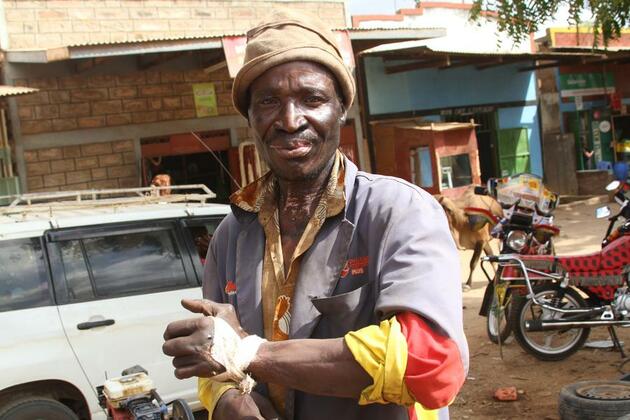Kenya battles rising snakebite cases as climate change drives snakes closer to humans
Xinhua
26 Mar 2025, 13:45 GMT+10

A victim of snake bite is seen in Kitui County, Kenya, Jan. 14, 2025. (Photo by Rose Nganga/Xinhua)In Ikanga, a village in Kenya's Kitui County, 42-year-old farmer Agnes Mwikali vividly recalls the searing pain she felt when she accidentally stepped on a puff adder, one of Kenya's most venomous snakes.NAIROBI, March 26 (Xinhua) -- In Ikanga village, located in Kenya's Kitui County, 42-year-old farmer Agnes Mwikali vividly recalls the searing pain she felt when she accidentally stepped on a puff adder, one of Kenya's most venomous snakes.Without immediate medical care, she turned to traditional remedies, which offered little relief. By the time she reached the nearest health center, more than 30 kilometers away, her leg was swollen and discolored. Though she survived, she now walks with a limp.According to Lynn Kwitan, head of Kitui County's Public Health and Sanitation Department, the county records over 800 snakebite cases annually. Nationwide, Kenya experiences an estimated 20,000 snakebites each year, resulting in over 4,000 deaths and thousands of long-term disabilities.Experts said that climate change and human expansion are bringing venomous snakes closer to people."Snakes are highly sensitive to environmental changes. When their habitats are destroyed or prey becomes scarce due to drought, they venture closer to human dwellings," said George Oluoch, deputy director at the Kenya Snakebite Research and Intervention Center (KSRIC).People participate in training on snake bites in Baringo County, Kenya, Jan. 14, 2025. (Photo by Rose Nganga/Xinhua)In regions like Tana River and Kisumu, heavy rains displace snakes from their burrows, increasing the risk of bites. Meanwhile, in drought-stricken areas like Baringo and Turkana, humans and snakes compete for limited water sources, leading to more encounters.Expanding human settlements further contribute to the problem. As forests and grasslands are cleared for agriculture and infrastructure, interactions between humans and snakes become more frequent.The World Health Organization (WHO) classifies snakebite envenoming as a neglected tropical disease, primarily affecting rural communities in low- and middle-income countries. The agency estimates that between 435,000 and 580,000 snakebite cases in Africa require treatment annually.However, access to healthcare remains a major challenge. In remote areas, victims must travel long distances for treatment, only to find that antivenom is scarce and expensive. A single dose costs over 10,000 Kenyan shillings (about 77 U.S. dollars), and multiple doses are often required."Snakebite is a medical emergency," said Oluoch. "But in many rural communities, long distances, inadequate transport, and understaffed health facilities delay critical care."Despite the challenges, Kenya is taking steps to address the issue. The KSRIC, in collaboration with the Liverpool School of Tropical Medicine, is developing an East African antivenom to improve treatment accessibility.Mwanthi Maliwa, a victim of a puff adder snake bite, gestures with his hand in Kitui County, Kenya, Jan. 14, 2025. (Photo by Rose Nganga/Xinhua)Winnie Bore, founder of the Nairobi-based Snakebite Rescue, Rehabilitation and Research Center, emphasizes the need for better healthcare access, particularly in rural areas. "If we can improve care and response at the community level, we can save lives," she said.The KSRIC and its partners are intensifying community education on snakebite prevention, first aid and the importance of seeking prompt medical attention. Technology is also playing a key role."Mobile apps and telemedicine solutions help community health volunteers consult specialists in real time," Oluoch said. "We are also exploring the use of drones to deliver antivenom to remote areas. This could significantly reduce the time it takes to get life-saving treatment to victims."As Kenya works to improve antivenom accessibility, further research is needed to understand how climate change is influencing snake behavior and increasing human-snake interactions.
 Share
Share
 Tweet
Tweet
 Share
Share
 Flip
Flip
 Email
Email
Watch latest videos
Subscribe and Follow
Get a daily dose of Kenya Star news through our daily email, its complimentary and keeps you fully up to date with world and business news as well.
News RELEASES
Publish news of your business, community or sports group, personnel appointments, major event and more by submitting a news release to Kenya Star.
More InformationAfrica
SectionKenya battles rising snakebite cases as climate change drives snakes closer to humans
A victim of snake bite is seen in Kitui County, Kenya, Jan. 14, 2025. (Photo by Rose Nganga/Xinhua)In Ikanga, a village in Kenya's...
(Hello Africa) Global rally blockbuster elevates Kenya's profile as emerging sports tourism hub
A racing car drives to the finishing line during the World Rally Championship (WRC) Safari Rally Kenya in Naivasha, Kenya, on March...
UAE: Sharjah Chamber outlines its 2025-2027 strategy
Sharjah [UAE], March 25 (ANI/WAM): The Sharjah Chamber of Commerce and Industry (SCCI)'s Board of Directors has reviewed the Chamber's...
Interview: Trump's tariff policy disrupts global trade, hurts African economies, says Kenyan expert
U.S. President Donald Trump walks toward the South Lawn to board Marine One at the White House in Washington, D.C., the United States,...
South Africa dismisses 'white genocide' claims
Elon Musk has echoed US President Donald Trump's allegations that Pretoria mistreats Afrikaners ...
South Africa dismisses white genocide claims
Elon Musk has echoed US President Donald Trumps allegations that Pretoria mistreats Afrikaners South African President Cyril Ramaphosa...
World
SectionIreland’s Central Bank warns of economic risk from US-EU trade dispute
DUBLIN, Ireland: As tensions rise between the United States and the European Union over potential tariffs, Ireland's Central Bank governor...
ALP in front ahead of upcoming election, but Coalition gaining ground
SYDNEY, Australia - A recent Roy Morgan survey indicates that if a federal election were held today, the Australian Labor Party (ALP)...
"Muslims are safer in India than anywhere else in world": BJP MP Sakshi Maharaj
New Delhi [India], March 26 (ANI): Bharatiya Janata Party MP Sakshi Maharaj has voiced his support for Uttar Pradesh Chief Minister...
BNM holds protest in Germany to mark 77 years of Pakistan's occupation of Balochistan
Hanover [Germany], March 26 (ANI): The Baloch National Movement (BNM) organised a protest rally in Hanover, Germany, to mark the 77th...
US intelligence warns of Russian media threat
Moscows influence activities are expected to intensify and become more sophisticated, a threat assessment has claimed Russia is using...
Phil Simmons to continue as Bangladesh head coach until 2027 ODI World Cup
Dhaka [Bangladesh], March 26 (ANI): Phil Simmons will continue as Bangladesh's head coach for the next two years until the 2027 ODI...












